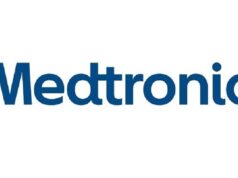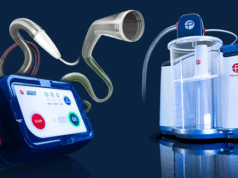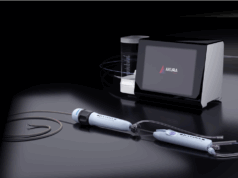 An accomplished vascular surgeon and prominent clinical researcher in the venous field, Kathleen Gibson (Lake Washington Vascular Surgeons, Bellevue, USA) plays an active role in a range of venous and vascular societies, and is currently involved in developing standardisation of definitions and tools for treating pelvic venous disease. In this interview, Gibson speaks to Venous News about her mentors, research interests, and the International Pelvic Vein Work Group.
An accomplished vascular surgeon and prominent clinical researcher in the venous field, Kathleen Gibson (Lake Washington Vascular Surgeons, Bellevue, USA) plays an active role in a range of venous and vascular societies, and is currently involved in developing standardisation of definitions and tools for treating pelvic venous disease. In this interview, Gibson speaks to Venous News about her mentors, research interests, and the International Pelvic Vein Work Group.
What led you to become a doctor, and why did you choose to specialise in vascular surgery and the venous field?
My first interests were maths and science, and I first obtained a degree in Chemical Engineering. I enjoyed the challenges of engineering, but also had an interest in medicine, as I enjoy more direct personal interactions, so I decided to apply to medical school. I became interested in vascular surgery because of several factors: strong mentorship from Dr Eugene Strandness (a pioneer in our field), the attraction of the long-term relationships vascular surgeons have with their patients, and the intricate and complex nature of vascular procedures. I still practice both arterial and venous surgery, but most of my clinical research interests have skewed towards the venous side of the field. I enjoy treating venous patients, as it allows me to have a significant impact on the quality of life of patients across nearly all age ranges, both healthy and ill.
What mentors have influenced you in your career and what did you learn from them?
My two most important mentors were Dr Eugene Strandness and Dr Mark Meissner. I was the first female Vascular Surgery Fellow at the University of Washington, much because of Dr Strandness’s encouragement. He taught me how to be a critical thinker, but an even more important lesson I learned from him was how to be kind and supportive of those around you. Dr Strandness was extremely supportive of the residents, fellows and vascular technologists working for him. A lot of his colleagues remember him as a great thinker and a hard-nosed interrogator at meetings, but he had a softer side. He knew the names of the housekeeping staff at the hospital and held a baby shower for me when I was in his lab.
Dr Meissner is both a mentor and a good friend. He trained under Dr Strandness as well, but was several years ahead of me. When he was a junior faculty member, I operated with him frequently and learned from his technical expertise—but I actually have learned more from him since I have been out in practice. He has been nothing but supportive of me and my career, and he is one of the smartest people I know. He has led me by his example to continue to be intellectually curious, and to always place my patients first.
What are your current areas of research?
On the arterial side, I am the principal investigator for the CREST II trial (carotid endarterectomy vs. stenting vs. medical management) for asymptomatic carotid disease and the COMPASS trial investigating the use of aspirin and Factor Xa inhibitors for the prevention of cardiovascular events.
In the venous space, I am currently involved in the venous stenting trials, and treatment of superficial venous disease with both truncal ablation and perforator treatment.
Which area of venous research do you think currently shows the most exciting or important developments?
I think some of our most exciting developments will be coming over the next decade. With the increased interest in venous disease in the pelvis and abdomen—both reflux and obstruction—it will be critically important to have quality research that shows us how best to treat these patients.
In the last year, which papers have you found the most important for the venous field?
Two papers that I think will have significant impact are the ATTRACT trial (published in the New England Journal of Medicine in December), and the EVRA trial (published in the same journal in May). Although there are arguments that the protocols used in the ATTRACT trial are no longer up-to-date with current techniques, I think it will influence which patient groups are offered thrombolysis for acute deep venous thrombosis.
The EVRA trial showed that early endovenous ablation resulted in faster wound healing in patients with venous ulceration compared to delayed ablation—findings which may change treatment strategies for patients with advanced venous disease.
You have recently started the International Pelvic Vein Work Group together with colleagues from several different institutions. What is the aim of this initiative?
The aims of the initiative at this time are: to establish evidence-based disease definitions for pelvic venous disorders; develop discriminative tools, e.g. to categorise the various forms of pelvic venous disorders, analogous to the CEAP model for lower extremity venous disease; and develop validated disease-specific health related quality of life outcome measures that can be used as a primary endpoint in clinical trials, including drug and device trials to support labelling indications.
One of the main problems in vein care today is that there is no standard of practice in this space. While pelvic venous disorders are increasingly recognised and studied, a lack of standard terminology has hampered our understanding of the best practices for treating these patients.
Why do you think it is important to ensure the Work Group is interdisciplinary, and are there any challenges in that aspect?
There are many specialty groups that have an interest in the treatment of patients with pelvic venous disease. Buy-in of all physicians who care for these patients is important, in order to understand how to best develop these tools and to lead to widespread adoption by clinicians and researchers. Standardised and validated tools will allow us to gather the high-quality evidence needed to create guidelines for the diagnosis and treatment of patients with pelvic venous disorders across specialty groups.
Currently, the groups we have approached include representatives from the American College of Phlebology (ACP), the Society of Interventional Radiology (SIR), the American Venous Forum (AVF), the International Union of Phlebology (UIP), the European Venous Forum (EVF), the American College of Obstetrics and Gynecology (ACOG), Cardiovascular and Interventional Radiology Society of Europe (CIRSE), the International Pelvic Pain Society (IPPS), Korean Society of Interventional Radiology (KSIR), and additional organisations from Latin America and Asia.
We had a recent international meeting in Chicago, and having a multidisciplinary group was of great value—all specialists fully participated and provided an incredible breadth of experience and perspective.
What is next for you in your research?
Currently, I am working on collecting five-year data for the VeClose Venaseal (Medtronic) versus radiofrequency ablation trial, finishing enrolment for the Abre (Medtronic) venous stent trial and potentially starting several new trials next year. I am also working on writing manuscripts for the recently completed SECURE trial on laser ablation for perforator veins, and the one-year results of the WAVES Venaseal trial.
What advice would you give to someone interested in specialising in venous disorders?
Always listen to your patients: treat what is bothering them, not just what is abnormal on imaging. Make sure your treatment is always patient-centred and you are performing it for the right reasons. Be knowledgeable about the whole spectrum of venous disorders: if you do not have the expertise to manage a particular disease state, be sure to know where to send your patient.
What was the most memorable case of your career, and why?
Usually the cases that go wrong are the ones that stay with you, but one of my most memorable cases that had a happy ending was a successful deep venous stenting case for a young man who had significant venous claudication several years following a postsurgical iliofemoral deep venous thrombosis. He was on active duty with a marine search and rescue team and could no longer meet the physical training requirements, and therefore was in danger of having to end a career that he loved. Six months after his stenting (because he could not go to work on full anticoagulation), he was able to pass his personal training requirements and go back to work.
How do you prefer to spend your time outside of work?
An answer commonly given in interviews but absolutely true—I most enjoy spending time with my family: my husband, two children and three dogs. We all enjoy travelling (usually without the dogs) and have been on many adventures around the world. One of my favourite quotes is, “travelling is one of the few ways you can spend money yet grow richer.”
Fact File
Current appointments (selected)
2014- American College of Phlebology: Scientific Committee
2014- American College of Phlebology: Guidelines Committee
2013- American Venous Forum: Membership Committee, 2018 Chair
Education
2011 Endovascular Fellowship: Kaiser Permanente Hospital, Honolulu, USA
2001 Vascular Surgery Fellowship: University of Washington School of Medicine, Seattle, USA
1994-99 General Surgery Residency: University of Washington School of Medicine, Seattle, USA
1990-94 MD: University of Washington School of Medicine, Seattle, USA
1989 BS Chemical Engineering: University of Washington, Seattle, USA
Board positions
2015- Board of Directors: American Board of Venous and Lymphtatic Medicine
2014- Board of Directors: American College of Phlebology
2010-13 Board Member: Overlake Hospital Medical Center
Committees and editorial boards (selected)
2018- International Pelvic Vein Work Group (co-sponsored by ACP and SIR)
2018 Program committee and registry research co-chair: American College of Phlebology 2014- Vein Magazine: Medical Advisory Board 2013- European Journal of Vascular and Endovascular Surgery: Selected Reviewer
Society affiliations
• Society for Vascular Sugery
• American Venous Forum
• American College of Phlebology
• European Venous Forum
• Western Vascular Society
• Pacific Northwest Vascular Society
• Fellow, American College of Surgeons
• Alpha Omega Alpha
• Henry Harkins Society
• Washington State Medical Association









